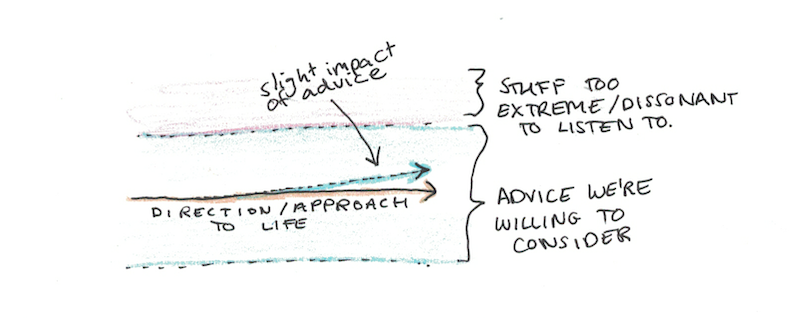Alexis Ohanian, founder of Reddit, recently spoke out against what he calls “hustle porn”:
“This idea that unless you are suffering, grinding, working every hour of every day, you’re not working hard enough … this is one of the most toxic, dangerous things in tech right now,” … “It’s such bullshit, such utter bullshit. It has deleterious effects not just on your business but on your wellbeing.”
[Source]
Ohanian attacks the extreme workaholism and martyrdom levels of effort common in start-up culture.
Compare this now to a different complaint, against so-called “mediocrity porn”:
Taking a nearly opposite stance, this attacks the glut of advice suggesting to lower your ambitions, feel less stress and accept that you probably won’t be able to change things.
Both Critiques are Probably True
I think both critiques are probably true. It’s true that the hustle expected of start-up entrepreneurs is probably unproductive and debilitating. Instead of forming useful companies, it becomes a signaling tool to demonstrate how “serious” you are.
In that way, it’s no different from the Japanese salarymen (and women) who put in 16-hour days at their company to demonstrate loyalty. It signals commitment to the team, but probably at a cost of actual efficiency and emotional well-being.
Similarly, I agree that a lot of people probably do need to be inspired and pushed to change their lives. That was what originally started me on my own path years ago, and I’m confident messages like the one critiqued in the Twitter dialog above wouldn’t have resonated with me.
Why Not Have Both? The Benefits of Pluralism
When I was younger, I used to form strong opinions about what was the “correct” way to live life. People who didn’t agree with me were misguided, weak-willed or otherwise holding themselves back from really doing it the right way.
The older I’ve gotten, though, the more I see how many different valid ways there are of living life. Just like some businesses can success with a low-cost strategy and others with a high-cost strategy, there’s many different approaches to life that can be equally lead to happy, fulfilling lives.
In the arguments around hustle and mediocrity “porn”, what I’m not seeing is a recognition that the two could co-exist. That we need people who resonate with both messages, and the availability of both types of advice is helpful to the individuals who hear it and to society at large.
Hustle porn may lead to negative consequences in the extreme, but there’s probably a lot of ambitious people who want a kick to do something harder, more intense and to dream bigger. For the people who are inclined towards those ambitions, I don’t think the call to greater dreams and the work they require is such a bad thing.
Mediocrity porn may lead to people avoiding fixing their problems in the extreme, but there’s also a lot of stressed-out people who are stuck. Adopting an approach to soothe those worries and become more patient and accepting of life is also going to be helpful to many.
I Trust People to Self-Select Which Advice Will Be Helpful
Many critics of one school of advice or another, attack it on the idea that those listening to it (and following it) will be personally harmed by the advice it contains.
I’m sure that this happens. It’s possible to hear some bad advice that wasn’t meant for you, and to be harmed by it.
However, I think this situation is a lot less common than people naively expect, for a couple reasons:
Most general advice doesn’t actually change behavior. The people reading “hustle porn” or “mediocrity porn” may be different, but that isn’t usually because of the advice. I know how hard it is to change people’s behaviors through advice, even when the person listening is highly motivated. For most people, advice is something that articulates and justifies their previous inclinations, it doesn’t alter their overall approach.

We have built-in feedback mechanisms to reject advice which doesn’t work. This may fail on the level of specific tactics, but at the level of broad moods and motivations, I think people either resonate with advice or they don’t. Those who don’t resonate are unlikely to stick with it, and positive feedback from the environment is a big part of resonance. If you try something and it harms you, you’re more likely to give it up.
I think bad tactical advice can be a lot more dangerous, say proposing a diet that’s actually unhealthy or a workout routine that’s likely to injure you. However, most of the advice above fits in at the level of an overall mood or strategy, and I simply think that people are more resistant to changing their default strategies and even less likely to do so in the face of negative feedback than these critiques would suggest.
In the end, the world needs all types of people following all types of strategies. We need rebels and conformists, ambition and acceptance, randomness and stability, hustle and mediocrity. Diverse ways of living to fit into a diverse niches of a big and complicated world. Each of us need to find our own way.


 I'm a Wall Street Journal bestselling author, podcast host, computer programmer and an avid reader. Since 2006, I've published weekly essays on this website to help people like you learn and think better. My work has been featured in The New York Times, BBC, TEDx, Pocket, Business Insider and more. I don't promise I have all the answers, just a place to start.
I'm a Wall Street Journal bestselling author, podcast host, computer programmer and an avid reader. Since 2006, I've published weekly essays on this website to help people like you learn and think better. My work has been featured in The New York Times, BBC, TEDx, Pocket, Business Insider and more. I don't promise I have all the answers, just a place to start.